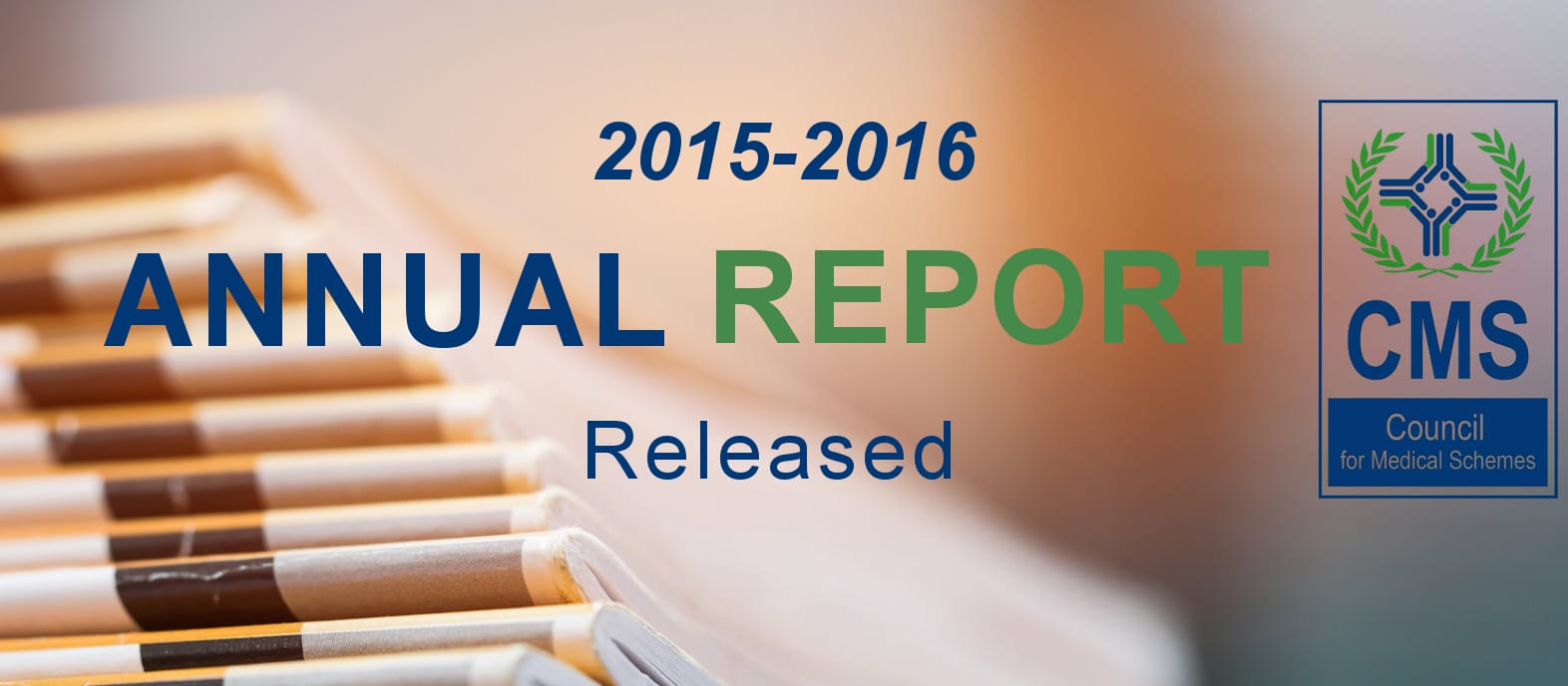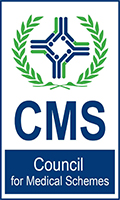
CMS releases annual report confirming healthy state of the medical schemes INDUSTRY
The Council for Medical Schemes (CMS), the regulator of the medical schemes industry, released its Annual Report for 2015-2016 today (14 October), which includes the most comprehensive report on the private medical schemes industry in South Africa.
Mr. Daniel Lehutjo, Acting Chief Executive Officer and Registrar of the CMS said, “We are pleased to report that the Auditor-General of South Africa provided the CMS with its 16th unqualified audit report in a row for the manner in which the CMS managed its financial affairs and complied with the requirements of the Public Finance Management Act 1 of 1999 (PFMA) and other applicable legislation. The organisation’s performance highlights the commitment of Council, executive management, and our employees to uphold the mandate of the CMS, as set in the Medical Schemes Act, 131 of 1998 (the Act).
What makes this year’s report special for the CMS according to Lehutjo, is the fact that the Auditor General gave the organisation a clean opinion, with no area of improvement identified.
In line with the legislation, the CMS continued to deliver on its regulatory mandate as an honest and transparent regulator, focusing on its key objective to protect the interest of members and beneficiaries of medical schemes. As empowered by the Act, the CMS provided regulatory supervision to the 83 medical schemes currently registered in the country, enforcing compliance with statutory provisions; accrediting administrators, brokers, and managed care organisations; as well as investigating and adjudicating complaints.
Against the backdrop of a constantly changing health policy environment, the CMS has continued to provide support to the Minister of Health and the department in carrying out health reforms. The CMS has provided a comprehensive input in response to the White Paper on the National Health Insurance (NHI) and continues to support the work that is done by the NHI work-streams. The CMS also provided input in the Competition Commission’s Health Market Inquiry.
Industry Overview
Number of medical schemes and beneficiaries
- The total number of medical schemes registered in South Africa remained at 83 in 2015, with 23 open schemes and 60 restricted schemes. The industry experienced slight changes in the number of schemes by size category.
- Altogether the 83 schemes had a total number of 8.809 million members comprising 3.950 million main members and 4.858 million dependants as at 31 December 2015. There was a year-on-year decrease of 0.06 % in the total number of medical scheme beneficiaries, from 8.814 million in December 2014 to 8.809 million in December 2015. The decrease marks the first negative growth experienced in the medical scheme industry since 2004. The total number of beneficiaries of restricted schemes showed a negative growth of 1.1% compared to a 0.79% increase in the beneficiaries of open schemes.
Age of beneficiaries
- The average age of medical scheme beneficiaries in 2015 was 32.3 years compared to 32.1 years reported in 2014. In total, the number of male beneficiaries was slightly lower at 47.39% compared to that of female beneficiaries which stood at 52.61% in 2015. The pensioner ratio was also lower. Female beneficiaries were generally older than male beneficiaries. The average age of female medical scheme beneficiaries was 33.2 years in 2015 and that of males 31.3 years.
- In general, the pensioner ratio increased slightly to 7.7% in 2015, up from 7.3% in 2014, with pensioner ratios for both male and female beneficiaries rising.
- The introduction of GEMS has made a significant impact on the average age of beneficiaries of restricted schemes vis-à-vis those of open schemes since 2007. In 2015 the average number of beneficiaries of open schemes was 33.8 years (34.8 years if Discovery Health Medical Scheme is excluded) while the average age of beneficiaries of restricted schemes stood at 30.5 years (if GEMS is excluded).
Contribution income and healthcare expenditure
- Scheme contributions increased by 8.1% to R151.6 billion as at December 2015 from R140.2 billion in December 2014. Gross contributions rose by 8.3% to R1 439.8 from R1 329.8 in 2014.
- The total gross relevant healthcare expenditure incurred by medical schemes increased by 8.9% to R138.9 billion from R127.6 billion in 2014. The total gross relevant healthcare expenditure incurred increased by 9.0% to R1 319.2 from R1 210.3 in 2014. This year’s claims figures as well as the comparative figure for 2014 include accredited managed care services as stipulated in Circular 56 of 2015.
Expenditure on hospitals and specialists
8. Expenditure on healthcare benefits increased (in nominal terms) by 9.0% from R127.2 billion in 2014 to R138.6 billion in 2015. Total hospital expenditure by medical schemes comprised R51.4 billion or 37.1% of the R138.6 billion that medical schemes paid to all healthcare providers in 2015. Total medical scheme expenditure on private hospitals increased by 9.36% to R51.1 billion from R46.8 billion in 2014.
The amount paid to supplementary and allied health professionals in 2015 increased by 12.65% from R8.9 billion in 2014 to R10 billion in 2015. This category accounted for 7.2% of all benefits paid by schemes in 2015. Payments to all specialists (anesthetists, medical specialists, pathology services, radiology services, and surgical specialists) amounted to R32.5 billion or 23.5% of total healthcare benefits paid in 2015. This amount increased by 10.90% from R29.3 billion paid in 2014. Payments to medical specialists amounted to R9.1 billion or 6.6% of total healthcare benefits paid in 2015. About 55% of the R9.1 billion paid to medical specialists in 2015 was paid to those operating in hospitals. Expenditure on pathology services amounted to R7.2 billion or 5.3% of healthcare benefits paid while expenditure on surgical specialists and radiology services amounted to R7.2 billion and R5.9 billion respectively.
Other healthcare expenditure
- Expenditure on general practitioners (GPs) amounted to R8.6 billion or 6.2% of healthcare benefits paid, representing an increase of 5.51% on the 2014 figure of R8.1 billion. Only 11.5% of the R8.6 billion paid to GPs in 2015 was paid to those operating in hospitals. There is a strong negative correlation between the proportion of benefits paid to GPs and the proportion of benefits paid to hospitals. Medical schemes that have a high proportion of benefits paid to GPs tend to have a lower proportion of benefits paid to hospitals, while schemes that have a low proportion of benefits paid to GPs tend to have a higher proportion of benefits paid to hospitals. The results show the importance of primary healthcare interventions in bringing down the high cost associated with hospitalisation.
- Medical Technology recorded the most significant increase in the total benefits paid in2 015. The amount increased by 41% from 42.5 million in 2014 to 59.8 million in 2015, although this category accounted for less than 1% of all benefits paid by schemes in 2015.
- Medicines (and consumables) dispensed by pharmacists and providers other than hospitals amounted to R22.3 billion or 16.1% of total healthcare benefits paid in 2015. This represents an increase of 7.09% compared to R20.8 billion spent in 2014.
Healthcare benefits paid from the risk pool
- Healthcare benefits which medical schemes covered from their risk pools amounted to R124.6 billion in 2015 compared to R114.8 billion in 2014, an increase of 8.53%. The average risk amount increased by 8.57% to R14 220.80 in 2015 compared to R13 098.36 in 2014.
- Hospital expenditure accounted for 41.1% of risk benefits paid in 2015. Expenditure on medicines accounted for 13.8% of total risk pool benefits. Medical specialists consumed 6.7% of the pie, while risk pool expenditure on GPs was R6.4 billion or 5.2% of total risk pool benefits.
Prescribed minimum benefits
15. The total cost of prescribed minimum benefits (PMBs) for medical schemes amounted to R64.2 billion in 2015. The total risk benefits paid in 2015 was R124.7 billion. The expenditure on PMB-related healthcare benefits, therefore, constituted 51% of total risk benefits paid. In 2014 PMBs constituted 52% of total risk benefits paid.
The cost of PMBs is mainly driven by a combination of the following factors:
- Scheme demographic profile which impacts on the level of cross-subsidisation between the young and the old; the healthy and the sick;
- The burden of disease; and
- Cost of treatment which is strongly linked to contracting between schemes and providers.Non-healthcare expenditure
- Administration expenditure, being the largest component of non-healthcare expenditure in all medical schemes, grew by 7.4% to R11.0 billion between December 2014 (when it was reported at R10.2 billion) and December 2015. Administration expenditure was the main component of non-healthcare expenditure in 2015, at 84.6% (2014:84.7%).
- Broker costs, which include all commissions, service fees, and other distribution costs, increased by 5.8% from R1 707.1 million in 2014 to R1 806.4 million in 2015 (2014: 8.1%). Broker costs represented 13.9% of total non-healthcare expenditure in 2015, a slight decrease from 14.1% in 2014.
- Total non-healthcare expenditure (i.e. administration fees, fees paid for managed care, broker fees, impairments, and reinsurance) increased marginally by 1.5% to R1 1549.7 in 2015 from R1 1526.7 in 2014 in 2014.
Non-healthcare spending has consistently been a key focus for the CMS. Substantially high increases in non- healthcare expenditure which exceeded the rate of increase in contributions, were observed between 2000 and 2005. Even though the costs have generally reduced in real terms, there is still high spending non-health items, such as advertising and marketing, consulting and legal fees, and trustee remuneration; which continue to show upward trends and thus require attention. In recent years, the remuneration of trustees and Principal Officers of medical schemes has come under the spotlight, with increases being significantly higher than inflation, as well as the expenditure on Annual General Meeting (AGM) costs. In the interests of member protection, it is important that such expenditure is associated with a discernible value proposition.
Net healthcare results and impact on reserves
- The net healthcare result for all medical schemes combined reflected a deficit of R1 219.4 million in 2015 (2014: R456.0 million). Open schemes incurred a total deficit of R565.6 million (2014: R37.4 million surplus), and restricted schemes generated a combined deficit of R653.8 million (2014: R493.4 million). This deterioration is mainly due to the worsening claims ratios of all schemes from 90.8% in 2014 to 91.4% in 2015.
- A total of 65.2% (or 15 of 23) of open schemes and 56.7% (34 of 60) of restricted schemes showed net healthcare deficits during the year under review.
- The net surplus of all schemes combined, after investment income and consolidation adjustments, wasR2.5 billion (2014: R3.4 billion).
- Net investment and other income, as well as expenditure, decreased by 3.6% to R3.7 billion. Open schemes made a R1.4 billion (2014: R2.0 billion) surplus and restricted schemes a surplus of R1.2 billion (2014: R1.4 billion).
-
Net assets or members’ funds (total assets minus total liabilities) rose by 4.0% to end 2015 at R52.1 billion.
- Accumulated funds grew by 5.3% to R50.3 billion from the R47.7 billion recorded in 2014.
- The industry average solvency ratio decreased to 32.6% in 2015 from 33.2% in 2014. The solvency ratio of open schemes decreased by 2.7% to 29.2% in 2015 (2014: 30.0%). Restricted schemes experienced a decrease of 0.8% in their solvency ratio, 37.5% from 37.8% in 2014.
The full annual report of the CMS, along with Excel and PDF Annexures which contains detailed information on medical schemes can be accessed on www.medicalschemes.com.
– End
Prepared by:
Pulane Molefe
Manager: Communication Council for Medical Schemes 012 431 0512 p.molefe@medicalschemes.co.zaFor more information
Customer Care Centre
Council for Medical Schemes
0861 123 267 information@medicalschemes.co.zaMedia enquiries
Dr Elsabé Conradie
General Manager: Stakeholder Relations Council for Medical Schemes
012 431 0430 e.conradie@medicalschemes.co.za


